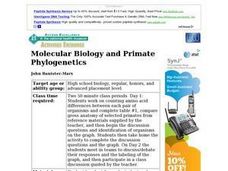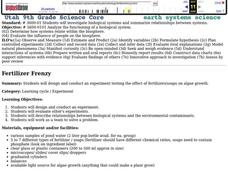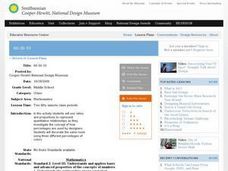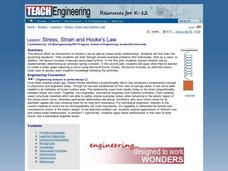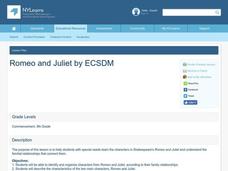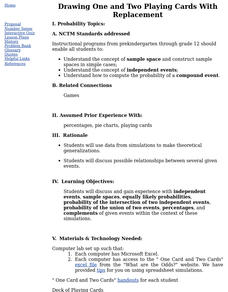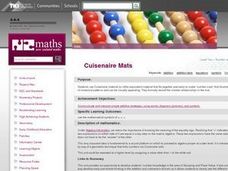Curated OER
Who is the Sea Otter Related to?
Learners examine the genetic relationships of different organisms. In groups, they discover the importance of genes and how different amino acids show various evolutionary relationships. They use an online database to continue their...
Curated OER
Amazon Food Chain
Explore food chains in the Amazon Rainforest using this resource. Learners discuss the predator vs. prey relationships in the food chain. Then, they create a food web to describe this relationship. This is a simple and effective way to...
Curated OER
Segmenting: To Kill a Mockingbird
Students divide the movie, To Kill a Mockingbird, on video disc into meaningful scenes, or segments using a digitizer. They name the segments and then choose examples that illustrate an instance of money, power, or human relationships....
Curated OER
Book Illustrations and Their Illustrators as Artists-K-3
Help learners construct relationships between written narratives and book illustrations, and between the narratives in formal visual art and the subject of the visual art. Look at Caldecott winning books and focus on the pictures drawn....
Curated OER
A Special Relationship
Young scholars discover the relationships of the lengths of the sides of right triangles and right triangles using a series of drawings on dot paper. They investigate and solve problems of standard (customary and metric units) and...
Curated OER
Molecular Biology and Primate Phylogenics
By counting differences in amino acids, biology stars examine the relationships between different primates. With information gleaned, they map out a phylogenic tree and discover common ancestry. You will need to create printable versions...
Curated OER
Learning Through Play
Second graders play a board about predator-prey relationships. They play with raptor and prey puppets and create stories about their relationships. They share their stories with the class.
Curated OER
Drugged Out Daphnia
Ninth graders participate in experiments to investigate the the effects of nicotine, caffeine, aspirin, alcohol, and sleeping pills on the heart rates of Daphina. They describe the relationships between common drugs and heart rates....
Curated OER
Fertilizer Frenzy
Ninth graders design and conduct an experiment. They evaluate other's experiments. Students describe relationships between biological systems and the environmental contaminants. They work as a team to solve a problem.
Curated OER
60-30-10
Students use ratios and proportions to represent quantitative relationships as they investigate the concept of how percentages are used by designers. Students decorate the same room using three different percentages of colors.
Curated OER
Stress, Strain and Hooke's Law
Students study Hooke's Law and stress-strain relationships. In this spring lesson students create a strain graph in Microsoft Excel.
Curated OER
Earthquake Formation
Students explore earthquakes. In this natural disaster and engineer career education instructional activity, students identify features of the earth's surface that increase the likelihood of an earthquake. Students use visual aids to...
Curated OER
Introducing the Concept: Percents
Students explore the math concept of percents. For this percents lesson, students examine visual examples of the relationships among fractions, decimals, and percents. Students also practice solving problems that their instructors model.
Curated OER
Evidence of Change Near the Arctic Circle
Students analyze graphs and make conclusions about climate change. In this climates lesson students produce graphs and identify relationships between parameters.
Curated OER
Romeo and Juliet
Use this SMART board activity to review the familial relationships in Romeo and Juliet. Review the characters from the play using descriptions first, then in the context of the other characters. The SMART board file (included) guides...
School Improvement in Maryland
United States Foreign Policy
Policies of United States government which promote or fail to promote relationships with other countries—national defense, arms control, security of other nations, trade, human rights, economic sanctions, foreign aid, etc.—come under...
Curated OER
From Restriction Maps to Cladograms
Biology aces analyze restriction maps to determine the relationships among different primate species and then complete a cladogram. Preface this lesson with an explanation of how restriction enzymes are used to create the DNA maps....
Curated OER
Creating Climographs
Students chart statistical information on graphs, interpret the information and use it to explain spatial relationships, and identify the relationship between climate and vegetation.
Curated OER
Web Adventure -- Oakland to Chicago Flight
Students develop an awareness of mathematics in a diverse number of careers, then describe three duties of a pilot that require mathematical skills. They increase understanding of interpreting data relationships presented in table format.
Curated OER
Trees of Mississippi
Students research tree species found in Mississippi, and record the tree types, numbers of trees, and locations. Students then research the forest industry sites, and determine possible relationships between industry location and tree...
Curated OER
Drawing One and Two Playing Cards With Replacement
Math whizzes use data from simulations to make theoretical generalizations and discuss possible relationships between several given events. They use a simple card game to generate data to be analyzed.
Curated OER
Finding Polygons in Cubist Art
Fourth graders explore geometric properties and relationships in a two-dimensional work of art. They first search for and identify polygons in a Cubist painting and then use polygons to create their own Cubist portrait of a classmate.
Curated OER
Africa: Introduction, Geography and Mapping
Young scholars study the geography of Africa through the use of maps. They locate, distinguish, and describe the relationships among varying regional and global patterns of geographic phenomena such as landforms, climate, and natural...
Curated OER
Cuisenaire Mats
First graders use Cuisenaire rods to study the mathematical symbols =, <, > for the relationships is equal to, is less than, and is greater than. They use the rods to show visual explanations of common number combinations.
Other popular searches
- Healthy Relationships
- Interpersonal Relationships
- Linear Relationships
- Quadratic Relationships
- Ecological Relationships
- Family Relationships
- Symbiotic Relationships
- Angle Relationships
- Family Health Relationships
- Economic Relationships
- Cause and Effect Relationships
- Relationships Among Organisms







